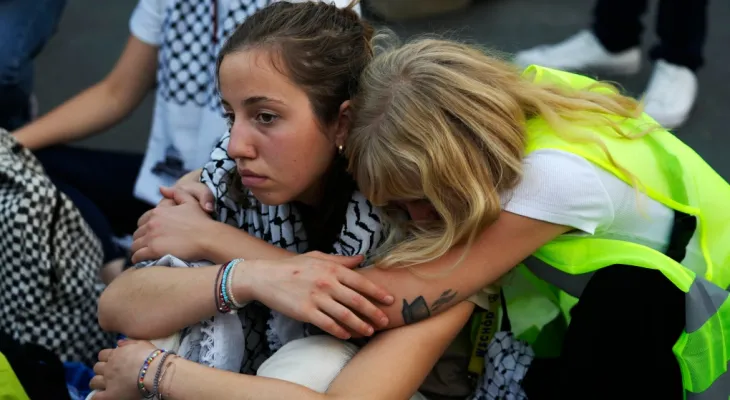Search here
Newspaper
Search here

Arab Canada News
News

Published: December 9, 2023
Activists dedicated today, Saturday, as a day of protest during the COP28 summit held in Dubai, but the rules of the game in the United Arab Emirates, which is under tight surveillance, mean imposing strict restrictions on what protesters can say, where they can walk, and what their signs can depict, and at times, the controls bordered on absurdity and silliness.
A small group of protesters who were protesting the arrest of activists—one from Egypt and two from the UAE—were not allowed to raise signs bearing their names, and a demonstration involving about 500 people late in the afternoon, the largest seen at the climate conference, was not able to pass beyond the UN-run Blue Zone in the country, and their calls for a ceasefire in the war between Israel and Hamas in the Gaza Strip effectively could not name the state involved.
Joyce Shia, a Human Rights Watch researcher focusing on the UAE, told the Associated Press after commenting on the matter: "It is a shocking level of censorship in an area that was supposed to guarantee the protection of fundamental freedoms such as freedom of expression, assembly, and association." Describing it as a restricted demonstration.
Pro-Palestinian protesters said they were told that protesters could not say "From the river to the sea," a slogan previously banned by the United Nations during the days of the United Nations Climate Change Conference (COP28).
Following the brutal attack launched by Hamas on Israel in October, and the subsequent bombing and ground attack in the Gaza Strip, pro-Palestinian marches used this phrase to call for the establishment of a single state on the land between the Jordan River and the Mediterranean Sea, and some Jews hear in the call a clear request for the destruction of Israel.
However, protester Dylan Hamilton from Scotland said it remains important for protesters to shout out their grievances, even if they seem like a dissonance among concerns ranging from climate change to war or indigenous rights.
Hamilton said, "It is necessary to remind negotiators about what they are negotiating." "It tries to remind people to care about those they will never meet."
Prior to the activists' demonstration, organized by Amnesty International and Human Rights Watch, protesters were forced to fold signs bearing the names of detainees—even after they had already crossed out messages related to them—and Shia said this happened about 10 minutes before the scheduled start of the UN protest, which said it could not guarantee the security of the protest.
While speaking during the protest, Shia also had to avoid naming the UAE and Egypt as part of UN rules.
She said, "The absurdity of what happened in this act today says a lot."
The UAE government, in response to questions from the Associated Press about the detainees protest, said it "does not comment on individual cases after court rulings."
The statement said, "In the spirit of inclusiveness, peaceful gatherings in designated areas were and continue to be welcomed." "We are committed to promoting dialogue and understanding while working together at COP28 to deliver impactful solutions to accelerate climate action."
Protesters held signs bearing pictures of Emirati activist Ahmed Mansour and Egyptian pro-democracy activist Alaa Abdel Fattah.
Mansour, winner of the prestigious Martin Ennals Award for Human Rights Defenders in 2015, repeatedly angered the authorities in the UAE, calling for free press and democratic freedoms in this authoritarian federation of seven sheikhdoms. He was targeted by Israeli spyware on his iPhone in 2016, likely deployed by the UAE government before his arrest in 2017 and sentencing to 10 years in prison due to his activism.
Abdel Fattah, who emerged during the pro-democracy Arab Spring uprisings in 2011, became a central figure for protesters during the United Nations Climate Change Conference (COP27) last year in Sharm El Sheikh, Egypt, where he stopped eating and drinking in protest of his detention. He has spent most of the past decade in prison due to his criticisms of Egypt’s rulers.
Since 2013, President Abdel Fattah el-Sissi's government has suppressed opponents and critics, jailed thousands, effectively banned protests, and monitored social media. El-Sissi has not released Abdel Fattah despite his obtaining British citizenship during imprisonment and interventions in his favor from world leaders, including U.S. President Joe Biden.
Protesters also raised a picture of Mohammed Al Siddiq, another Emirati arrested as part of the crackdown. Emirati citizens wearing white robes walked or passed by the protest carts, looking on curiously. The protests were scheduled days earlier, but negotiations with UN officials continued—likely due to the sensitivity of merely mentioning the names of detainees in the country.
Meanwhile, protesters organized a brief sit-in on Saturday at the OPEC platform over a leaked message allegedly calling on cartel member states to reject any attempt to include the phasedown of fossil fuels in any text at the summit.
Activist Nicholas Heyringer said, "It's like, you know, making an agreement to fight the tobacco industry and having the tobacco industry present at the negotiations. That is not acceptable." "It's like having a fox in the henhouse. And to be honest with you, I think at some point our comparisons will run out before their oil does."
Comments